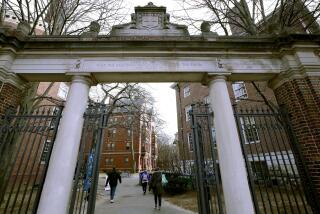Georgetown University to give slave descendants priority for admission

Georgetown University will give preference in admissions to the descendants of slaves owned by the Maryland Jesuits, the school has announced.
Reporting from Washington — Georgetown University will give preference in admissions to the descendants of slaves owned by the Maryland Jesuits as part of its effort to atone for profiting from the sale of enslaved people, the president of the prominent Jesuit university in Washington announced Thursday.
The announcement from President John DeGioia came as Georgetown released a report calling on its leaders to offer a formal apology for the university’s participation in the slave trade.
In 1838, two priests who served as president of the university orchestrated the sale of 272 men, women and children for $115,000, or roughly $3.3 million in today’s dollars, to pay off debts at the school. The slaves were sent from Jesuit plantations in Maryland to Louisiana, “where they labored under dreadful conditions,” and families were broken up, according to the report.
NEWSLETTER: Get the day’s top headlines from Times Editor Davan Maharaj »
The transaction was one of the most thoroughly documented large sales of enslaved people in history, and the names of many of the people sold are included in bills of sale, a transport manifest and other documents. Genealogical research conducted by Georgetown and by other organizations, including the New York Times, has identified many living descendants of the slaves.
The university will reach out to those descendants and recruit them to the university, and they will have the same advantage in admissions that’s given to people whose parents or grandparents attended Georgetown, DeGioia said. While universities around the United States have taken various approaches in attempting to atone for their participation in slavery, the establishment of an admissions preference appears to be unprecedented.
“We will give descendants the same consideration we give members of the Georgetown community in the admissions process,” he wrote in a letter to the university community.
In addition to the apology, the report outlined several other steps. The university had already committed to renaming two buildings that had been named for the priests who arranged the sale. On Thursday, DiGioia announced that those buildings will be named after Isaac, the enslaved man whose name is the first mentioned in documents of the sale, and Anne Marie Becraft, a free African American woman who founded a school for black girls in the Georgetown neighborhood in 1827.
Georgetown also will create a memorial to the slaves whose sale benefited the university, and it will establish an Institute for the Study of Slavery and its Legacies to support continued research into the history of slavery and engagement with descendants.
ALSO
Ex-Atlanta police officer is indicted in death of unarmed man
South Carolina children say clowns are trying to lure them into the woods
More to Read
Sign up for Essential California
The most important California stories and recommendations in your inbox every morning.
You may occasionally receive promotional content from the Los Angeles Times.










